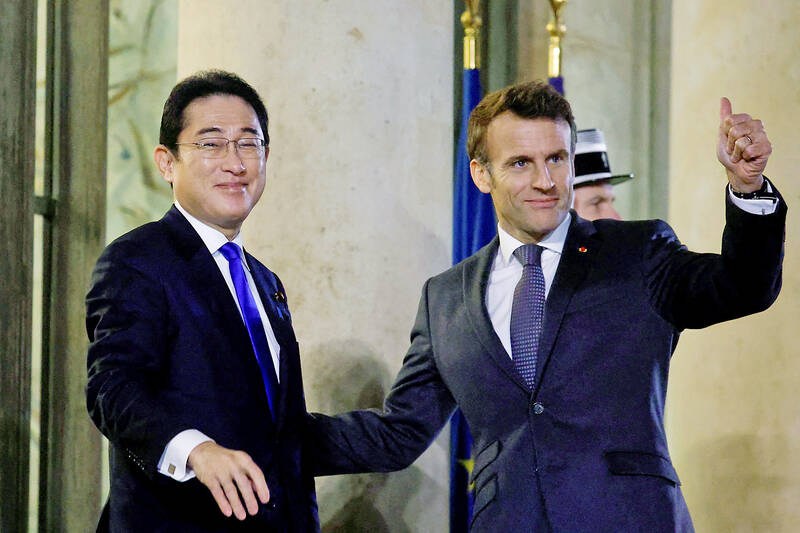The US wants to disperse US Marine units throughout Japan’s Okinawa islands by 2026, arming them with missiles and lighter gear to deter China’s military, and would discuss the plan with Tokyo in Washington, the Yomiuri Shimbun reported.
The US has already told Japan about the reorganization, which it would announce after a two-plus-two meeting in Washington today between the Japanese ministers of defense and foreign affairs and their US counterparts, the paper reported.
A Japanese Ministry of Foreign Affairs official declined to comment about the report, but said Japan and the US “will discuss matters regarding issues on the US Forces Japan, including the realignment of the US Forces Japan.”

Photo: Reuters
The creation of the new units, called Marine Littoral Regiments, is part of a major reorganization of the US Marine Corps outlined by its commandant, General David Berger, in 2020.
At the time Berger said that he wanted those units to work closely with Japan’s Self-Defense Forces to prevent easy access to the Pacific for the Chinese military.
In response to a question about the possible deployment of the new units, Chinese Ministry of Foreign Affairs spokesman Wang Wenbin (汪文斌) told a regular news conference yesterday that bilateral military cooperation between the US and Japan “should not harm the interests of third parties, and regional peace and stability.”
Under the littoral regiment concept, the US Marines are cutting aircraft numbers, and dumping most of their cannon artillery and heavy armor in favor of smaller “dispersed” forces equipped with missiles and drones that can operate in contested areas.
Japan hosts 18,000 US Marines, the biggest concentration outside the US. Most of them are in bases in Okinawa, which is part of a chain that stretches along the edge of the East China Sea to within about 100km of Taiwan.
In related news, Japanese Prime Minister Fumio Kishida and French President Emmanuel Macron on Monday pledged more security cooperation in the Asia-Pacific region as Kishida made his first visit to France since taking office.
Japan holds the presidency of the G7 and Kishida on Monday began a tour of fellow members France, Italy, the UK, Canada and the US.
In a joint statement with Macron on Monday evening, the Japanese prime minister said he was looking forward to more cooperation with France in the Asia-Pacific region.
“France is a leading partner for the realization of a free and open Indo-Pacific,” Kishida said.
“As unilateral attempts to change by force the status quo in the East and South China Sea intensify and the security environment becomes increasingly tense, we wish to continue to cooperate with France,” he said, alluding to joint military drills.
The Japanese government approved a major defense policy overhaul last month, including a significant spending hike, as it warned China posed the “greatest strategic challenge ever” to its security.
Macron said France and Japan would continue their “joint actions in the Indo-Pacific.”
Kishida is scheduled to meet US President Joe Biden on Friday.

The US government has signed defense cooperation agreements with Japan and the Philippines to boost the deterrence capabilities of countries in the first island chain, a report by the National Security Bureau (NSB) showed. The main countries on the first island chain include the two nations and Taiwan. The bureau is to present the report at a meeting of the legislature’s Foreign Affairs and National Defense Committee tomorrow. The US military has deployed Typhon missile systems to Japan’s Yamaguchi Prefecture and Zambales province in the Philippines during their joint military exercises. It has also installed NMESIS anti-ship systems in Japan’s Okinawa

‘WIN-WIN’: The Philippines, and central and eastern European countries are important potential drone cooperation partners, Minister of Foreign Affairs Lin Chia-lung said Minister of Foreign Affairs Lin Chia-lung (林佳龍) in an interview published yesterday confirmed that there are joint ventures between Taiwan and Poland in the drone industry. Lin made the remark in an exclusive interview with the Chinese-language Liberty Times (the Taipei Times’ sister paper). The government-backed Taiwan Excellence Drone International Business Opportunities Alliance and the Polish Chamber of Unmanned Systems on Wednesday last week signed a memorandum of understanding in Poland to develop a “non-China” supply chain for drones and work together on key technologies. Asked if Taiwan prioritized Poland among central and eastern European countries in drone collaboration, Lin

Renewed border fighting between Thailand and Cambodia showed no signs of abating yesterday, leaving hundreds of thousands of displaced people in both countries living in strained conditions as more flooded into temporary shelters. Reporters on the Thai side of the border heard sounds of outgoing, indirect fire yesterday. About 400,000 people have been evacuated from affected areas in Thailand and about 700 schools closed while fighting was ongoing in four border provinces, said Thai Rear Admiral Surasant Kongsiri, a spokesman for the military. Cambodia evacuated more than 127,000 villagers and closed hundreds of schools, the Thai Ministry of Defense said. Thailand’s military announced that

CABINET APPROVAL: People seeking assisted reproduction must be assessed to determine whether they would be adequate parents, the planned changes say Proposed amendments to the Assisted Reproduction Act (人工生殖法) advanced yesterday by the Executive Yuan would grant married lesbian couples and single women access to legal assisted reproductive services. The proposed revisions are “based on the fundamental principle of respecting women’s reproductive autonomy,” Cabinet spokesperson Michelle Lee (李慧芝) quoted Vice Premier Cheng Li-chiun (鄭麗君), who presided over a Cabinet meeting earlier yesterday, as saying at the briefing. The draft amendment would be submitted to the legislature for review. The Ministry of Health and Welfare, which proposed the amendments, said that experts on children’s rights, gender equality, law and medicine attended cross-disciplinary meetings, adding that